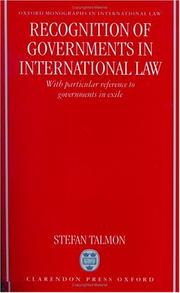| Listing 1 - 10 of 25 | << page >> |
Sort by
|
Book
ISBN: 1474434444 9781474434447 1474434436 9781474434430 9781474434454 1474434452 Year: 2018 Publisher: Edinburgh Edinburgh University Press
Abstract | Keywords | Export | Availability | Bookmark
 Loading...
Loading...Choose an application
- Reference Manager
- EndNote
- RefWorks (Direct export to RefWorks)
Joseph O'Mahoney systematically analyses 21 case studies - including the Manchurian Crisis, the Turkish invasion of Cyprus and Russia's annexation of Crimea - to explore why so many states have adopted a policy of non-recognition of the spoils of war.
State succession. --- Recognition (International law) --- De facto doctrine (International law) --- De facto government --- Estrada doctrine --- Nonrecognition of governments --- International law --- De facto doctrine --- State succession --- States, Creation of --- States, Succession of --- Succession of states --- Dismemberment of nations

ISBN: 0198265735 9780198265733 Year: 1998 Publisher: Oxford Clarendon
Abstract | Keywords | Export | Availability | Bookmark
 Loading...
Loading...Choose an application
- Reference Manager
- EndNote
- RefWorks (Direct export to RefWorks)
Governments in exile --- Recognition (International law) --- Gouvernements en exil --- Reconnaissance (Droit international) --- Governments in exile. --- Recognition (International law). --- De facto doctrine (International law) --- De facto government --- Estrada doctrine --- Nonrecognition of governments --- International law --- De facto doctrine --- State succession --- Refugee governments --- Exiles --- International relations --- Sovereignty --- State, The
Book
ISBN: 3428053389 9783428053384 Year: 1983 Volume: 10 Publisher: Berlin Duncker und Humblot
Abstract | Keywords | Export | Availability | Bookmark
 Loading...
Loading...Choose an application
- Reference Manager
- EndNote
- RefWorks (Direct export to RefWorks)
Recognition (International law) --- De facto doctrine --- 341.218 --- De facto doctrine (International law) --- De facto government --- Constitutional law --- Estrada doctrine --- Nonrecognition of governments --- International law --- State succession --- Ontstaan en erkenning van een staat. Statenopvolging --- 341.218 Ontstaan en erkenning van een staat. Statenopvolging
Book
ISBN: 0191697214 9780191697210 Year: 1999 Publisher: Oxford : Oxford University Press,
Abstract | Keywords | Export | Availability | Bookmark
 Loading...
Loading...Choose an application
- Reference Manager
- EndNote
- RefWorks (Direct export to RefWorks)
Informed by theoretical and comparative perspectives on governmental legitimacy, this work subjects the recognition controversies of the UN era to a systematic examination.
Legitimacy of governments. --- Recognition (International law) --- International law. --- Law of nations --- Nations, Law of --- Public international law --- Law --- De facto doctrine (International law) --- De facto government --- Estrada doctrine --- Nonrecognition of governments --- International law --- De facto doctrine --- State succession --- Governments, Legitimacy of --- Legitimacy (Constitutional law) --- Consensus (Social sciences) --- Revolutions --- Sovereignty --- State, The --- General will --- Political stability --- Regime change

ISBN: 0807862487 9780807862483 9780807827581 0807827584 0807827584 9798890874085 Year: 2003 Publisher: Chapel Hill, N.C. University of North Carolina Press
Abstract | Keywords | Export | Availability | Bookmark
 Loading...
Loading...Choose an application
- Reference Manager
- EndNote
- RefWorks (Direct export to RefWorks)
Using newly available material from both sides of the Iron Curtain, William Glenn Gray explores West Germany's efforts to prevent international acceptance of East Germany as a legitimate state following World War II. Unwilling to accept the division of their country, West German leaders regarded the German Democratic Republic (GDR) as an illegitimate upstart--a puppet of the occupying Soviet forces. Together with France, Britain, and the United States, West Germany applied political and financial pressure around the globe to ensure that the GDR remain unrecognized by all countries outs
Recognition (International law) --- World politics --- Coexistence (World politics) --- Peaceful coexistence --- De facto doctrine (International law) --- De facto government --- Estrada doctrine --- Nonrecognition of governments --- International law --- De facto doctrine --- State succession --- Hallstein, Walter, --- Germany (West) --- Germany (East) --- Foreign relations. --- Economic policy. --- Foreign relations --- History of Germany and Austria --- anno 1950-1959 --- anno 1960-1969 --- Germany (GDR) --- Germany
Book
ISBN: 9789004136557 9789047413561 Year: 2004 Publisher: Leiden; Boston : Brill | Nijhoff
Abstract | Keywords | Export | Availability | Bookmark
 Loading...
Loading...Choose an application
- Reference Manager
- EndNote
- RefWorks (Direct export to RefWorks)
This volume contains the first comprehensive study of legal issues arising with regard to the self-declared 'Republic of Somaliland' which, after more than 10 years of factual existence, is still facing international non -recognition. The case of Somaliland, in particular its unique position within the collapsed State of Somalia, challenges current international law doctrine regarding the interplay between non-recognition and the creation of States. Based upon an in-depth analysis of international law concerning the criteria of statehood and recognition, the author presents a legal framework against which cases of secession in the context of collapsed States should be measured. In applying this framework to the case of Somaliland, he demonstrates that the entity has established a sufficient level of peace, stability and effective governance to qualify as a State under international law. Given the legal uncertainty surrounding non-recognized de facto regimes such as Somaliland, the study finally attempts to identify legal rules which bind de facto regimes in the process of secession irrespective of their recognition as a State. Proposing a 'functional approach' to de facto regimes, the author argues that such entities are subject to obligations under international (human rights) law to the extent they are assuming governmental tasks.
Human rights --- International law --- Recognition (International law) --- De facto doctrine (International law) --- De facto government --- Estrada doctrine --- Nonrecognition of governments --- De facto doctrine --- State succession --- Law of nations --- Nations, Law of --- Public international law --- Law --- Basic rights --- Civil rights (International law) --- Rights, Human --- Rights of man --- Human security --- Transitional justice --- Truth commissions --- Law and legislation
Book
ISBN: 2247108113 Year: 2011 Publisher: [Place of publication not identified] Dalloz
Abstract | Keywords | Export | Availability | Bookmark
 Loading...
Loading...Choose an application
- Reference Manager
- EndNote
- RefWorks (Direct export to RefWorks)
Uti possidetis (International law) --- Boundaries --- Secession --- Recognition (International law) --- International Law --- Law, Politics & Government --- International Law - General --- De facto doctrine (International law) --- De facto government --- Estrada doctrine --- Nonrecognition of governments --- International law --- De facto doctrine --- State succession --- Sovereignty --- Separatist movements --- Borders (Geography) --- Boundary lines --- Frontiers --- Geographical boundaries --- International boundaries --- Lines, Boundary --- Natural boundaries --- Perimeters (Boundaries) --- Political boundaries --- Borderlands --- Territory, National --- Treaties --- Governmental law.
Book
ISBN: 9782233005090 2233005090 Year: 2007 Volume: 9 Publisher: France : Pedone,
Abstract | Keywords | Export | Availability | Bookmark
 Loading...
Loading...Choose an application
- Reference Manager
- EndNote
- RefWorks (Direct export to RefWorks)
Recognition (International law). --- Sanctions (International law). --- Legitimacy of governments --- Reconnaissance (Droit international) --- Sanctions (Droit international) --- Légitimité des gouvernements --- Recognition (International law) --- Sanctions (International law) --- BPB0805 --- 341 --- Internationaal recht. Volkenrecht --(algemeen) --- 341 Internationaal recht. Volkenrecht --(algemeen) --- Légitimité des gouvernements --- International sanctions (International law) --- Penalties (International law) --- International law --- De facto doctrine (International law) --- De facto government --- Estrada doctrine --- Nonrecognition of governments --- De facto doctrine --- State succession --- DROIT INTERNATIONAL PUBLIC --- ETAT --- Etats illégaux --- ONU --- FORMATION --- reconnaissance d'un Etat
Book
ISBN: 1526101033 9781526101037 9781526104847 1526104849 9781526109927 1526109921 1784993344 Year: 2016 Publisher: Manchester University Press
Abstract | Keywords | Export | Availability | Bookmark
 Loading...
Loading...Choose an application
- Reference Manager
- EndNote
- RefWorks (Direct export to RefWorks)
The notion of recognition, drawing on the philosophy of Hegel, has become increasingly central to international debates in recent years, yet there have been few attempts to critically examine new theoretical positions and empirical analyses of its possible meanings, limits and manifestations. Recognition and global politics examines the potential and limitations of the discourse of recognition as a strategy for reframing justice and injustice within contemporary world affairs. Drawing on resources from social and political theory and international relations theory as well as other areas including feminist theory, postcolonial studies and social psychology, this ambitious collection explores a range of political struggles, social movements and sites of opposition that have shaped certain practices and informed contentious debates in the language of recognition. How have recognition-based claims been deployed in relation to international, transnational and global politics? The contributors speak to central issues in current debates about cosmopolitanism, genocide, human rights, global capitalism, multiculturalism, rebellion and the environment. This innovative volume will push the boundaries of the debate on recognition into new areas, opening up provocative lines of inquiry and critique.
Recognition (International law) --- International law --- International relations --- Law of nations --- Nations, Law of --- Public international law --- Law --- De facto doctrine (International law) --- De facto government --- Estrada doctrine --- Nonrecognition of governments --- De facto doctrine --- State succession --- Social aspects. --- cosmopolitanism --- multiculturalism --- recognition --- feminism --- hegel --- globalisation --- genocide --- World Politics --- International Relations --- Philosophy --- Political Science --- WORLD POLITICS --- INTERNATIONAL RELATIONS --- PHILOSOPHY --- POLITICAL SCIENCE --- World politics --- Political science --- International law. --- International relations.
Multi
ISBN: 9164801675 Year: 1999 Publisher: Stockholm Nerenius och Santérus
Abstract | Keywords | Export | Availability | Bookmark
 Loading...
Loading...Choose an application
- Reference Manager
- EndNote
- RefWorks (Direct export to RefWorks)
International relations
---
-Recognition (International law)
---
#BIBC:ruil
| Listing 1 - 10 of 25 | << page >> |
Sort by
|

 Search
Search Feedback
Feedback About UniCat
About UniCat  Help
Help News
News